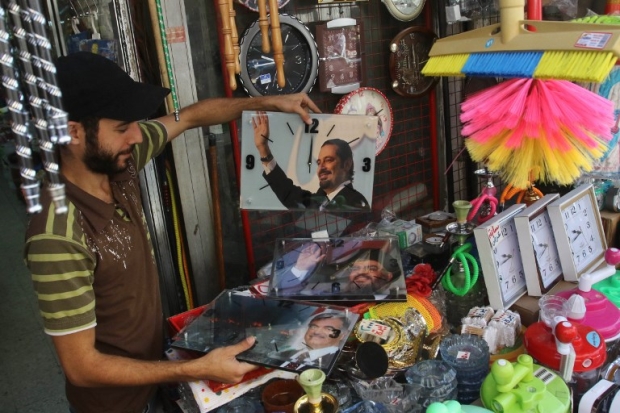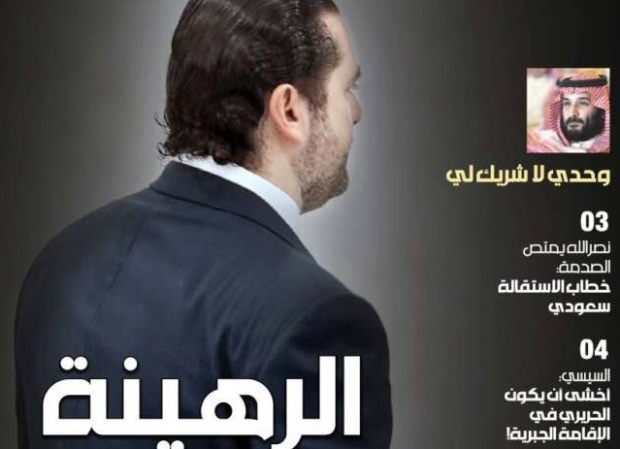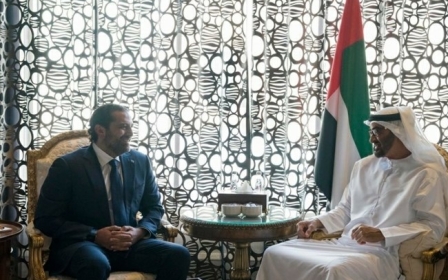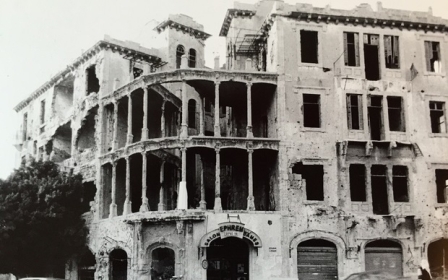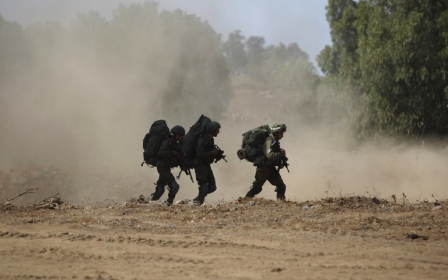'What goes up comes back down': Lebanese react to Hariri's resignation
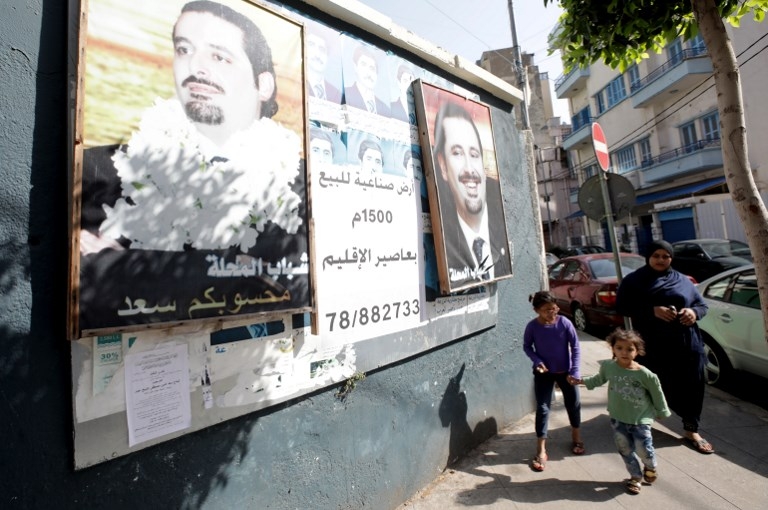
BEIRUT - After the unforeseen - and largely unexplained - resignation of Prime Minister Saad Hariri while in Riyadh on Saturday, a cloud of uncertainty has hung over the capital as many wonder exactly what the latest political crisis will mean for the country.
While memes emerged showing Hariri wearing a digital watch saying "Help" and Twitter users urged him to blink to cameras if he wanted to be rescued from Saudi Arabia, conversations on the streets here ranged from bleak forecasts of a new conflict to little more than a shrug of the shoulders.
We have lived through the civil war and had to move to Africa - Sierra Leone. Now my son, who is 35, has to live through the same struggle I had to face when I was young
- Fadi Leba’ine, 59, food preserves salesman
“What Hariri did is irresponsible,” said Usama, the owner of a clothes shop on bustling Hamra Street in the western Sunni-majority side of the city. Chain-smoking on a chair placed at the shop’s entrance, the 53-year-old spat a harsh sentence.
“It puts the country in danger and all of us,” he said.
Despite blaming the leader of the Future Movement – a party to which Usama is affiliated – his greatest criticism is reserved for Hezbollah, the Shia political party.
“All the political parties put their interests first. No one wants the best for the country. This is especially true for Hezbollah, who only wants to raise tensions in Lebanon. Hariri compromised [when he formed a government], what did Hezbollah do?” said Usama, who would only give his first name.
'What goes up ...'
Saad Hariri assumed office in December 2016 following a power-sharing agreement with President Michel Aoun, a Maronite Christian with strong ties to Hezbollah. The agreement ended a 29-month power vacuum and saw Hariri form a government that included Hezbollah, whose members have been charged by the International Court of Justice with the 2005 assassination of his father, Rafik Hariri.
In the neighbourhood of Geitawi – a largely Orthodox Christian and Armenian neighborhood in the heart of Beirut’s eastern district – Fadi Leba’ine also expressed worry for the current political situation.
“We have lived through the civil war and had to move to Africa - Sierra Leone. Now my son, who is 35, has to live through the same struggle I had to face when I was young. I imagine the children of my nephews will also have to live through the same things all over again,” Leba’ine said.
“When a customer enters the shop, they want to know which part of Lebanon I am from and which village,” he said. “If they don’t like what they hear, they won’t buy from me.”
Leba’ine fears that Hariri’s resignation will make Lebanon a key pawn in the regional chess game that Saudi Arabia and Iran are playing. In his experience, international relations have always, sooner or later, affected Lebanese citizens.
“What goes up comes back down,” Leba’ine said, using an Arabic expression that hints to the inevitability of future repercussions on Lebanese soil.
'People don't care'
Closer to the city centre, in the Christian quarter of Gemmayze, the 54-year-old Shia owner of a high-end boutique was confident the country would remain stable.
“I don’t think any group in Lebanon has the power to do anything stupid,” Amer Jabali told MEE. “Saudis are cowards, they fight their wars from the sky and they never win. And I don’t think Israel is stupid enough to fight the war for Saudi Arabia.”
'I don’t think any group in Lebanon has the power to do anything stupid'
- Amer Jabali, 54, boutique owner
Jabali also had confidence in the stability of the Lebanese banking system and said moving capital abroad was not an option for Lebanese business owners. “Foreign countries apply very high taxes, while in Lebanon you pay none,” he grinned. “It’s better to take a risk rather than becoming poor for sure.”
Right below the store’s name, on the entrance glass door, Jabali recently added a sign bearing a very political message: “Boycott weapons, save lives.” Before the formation of the government in 2016, another sign provocatively advertised sales “until a new president is elected".
Further north, in the Muslim quarter of Zokak el-Blatt, 25-year-old security guard Imad el Ali said everyone in the country has grown accustomed to a volatile political situation and had no fear for the immediate future. “Everything is going on as usual,” he said. “People don’t care about politics. They just want to go from home to work and back.”
As a Shia married to a Sunni Muslim, El Ali argued sectarian tensions are a thing of the past. “We got used to this country. We even marry each other,” he laughed.
Waiting for the earthquake
While views on the streets of Beirut greatly differ, government officials are on high alert. In a security meeting on Monday, President Aoun told security forces to be prepared for the possibility of unrest or terrorist attacks.
He also invited the media to act responsibly in their reporting so as not to raise tensions. However, in the regional context – where most news outlets are known to have political affiliations – narratives have been clearly skewed towards pro-Saudi or pro-Iranian standpoints.
In a piece published on the Hezbollah-owned Al Manar news site on Monday, Hariri's resignation is described as a clear outcome of Saudi threats and a further demonstration of a Saudi strategy aimed at "compensat[ing] for its failures on more than one front in the region". Several analysts quoted in the piece vent the theory - widely circulated on social media - that Hariri may be under house arrest in the Saudi capital.
Similarly, the pro-Hezbollah daily newspaper Al Akhbar featured a picture of Hariri with the headline "Hostage" on Monday.
A web page named "Free Saad Hariri" has also emerged, demanding Hariri’s release from “Saudi jails” and counting the days since he announced his resignation. While it is unclear who started the site and some believe it might be a joke, local websites claimed it was started by supporters who are genuinely concerned with the prime minister's safety.On the opposite side of the spectrum, Saudi news outlet Al Arabiya highlighted the accusations that Hariri has made towards Iran, including the alleged failed attempt on his life. "Hariri assured in his televised speech that Iran has a wild desire to destroy the Arab world and that, wherever it resolves to, it spreads war and discord," the article, published on Saturday, read.
An-Nahar, a newspaper which also supports Saudi Arabia but tends to be more moderate with its views, made a comparison between the current situation and the assassination of Hariri's father, Rafik, in 2005. "We are facing a recurring situation, but this time, fortunately, Saad Hariri survived," columnist Ahmed Ayyah wrote.
A separate report in the paper mocked a Lebanese tendency to be over-dramatic. "The 'earthquake' occurred and the 'bomb' exploded [...] are all Lebanese expressions to describe one situation: Lebanon without a government," it read.
At present, the "earthquake" is postponed until Hariri’s return from Saudi Arabia, when the legal procedure to replace him will be set in motion. Until then, news outlets will keep their fingers pointed in opposite directions. Meanwhile, many in Lebanon brace themselves for more hard times to come.
New MEE newsletter: Jerusalem Dispatch
Sign up to get the latest insights and analysis on Israel-Palestine, alongside Turkey Unpacked and other MEE newsletters
Middle East Eye delivers independent and unrivalled coverage and analysis of the Middle East, North Africa and beyond. To learn more about republishing this content and the associated fees, please fill out this form. More about MEE can be found here.


